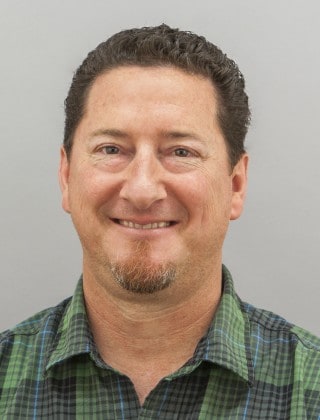“When I was a kid, I wanted to be a marine biologist. 40 years later I’m working in the APL working with marine-based research.”
Making vision into reality
A true professional in his craft, Peter (Pete) Frane is the manager of the APL-UW’s machine shop. He manages a group of six fabrication engineers and is responsible for the shop’s daily operations.
Pete came to the APL in 2015. Before coming on board, he worked in the manufacturing industries of Chicago, Southern California, and Phoenix for 25 years. From the automotive, medical, and military industries, to working electronics, computers, and more, Pete has done it all.
The machine shop builds all sorts of high-precision components that make up the instruments and assemblies APL’s researchers and engineers use to conduct their studies. The APL’s engineering teams provide designs that the machine shop team then manufactures many components for instruments that are built, tested, and deployed into the field. Recently, the machine shop manufactured components for autonomous vehicles that cruise around the ocean and collect data on currents, water temperature, tides, sea life, and more.
Peter Frane

Position
Machine Shop Manager, Ocean Engineering
Background
I found my interest in machine shop while in high school career and technical classes. My best friend and his father had a machine shop in northern Illinois, where I worked during summer breaks. Eventually, I completed a four-year apprenticeship through the Tooling and Manufacturing Association to become a Journeyman Toolmaker.
How I came to APL-UW
Before coming to the APL-UW, while working as an instrument maker at General Dynamics one of my coworkers left the company to work for the University of Las Vegas as a machinist. I didn’t know universities had that need. My wife and I started doing research and she came across the position of Instrument Maker for the APL-UW. Wanting to relocate to the Pacific Northwest, I came aboard as an instrument maker and loved the job and the research that’s done here. I was groomed to move into the supervisor role when my predecessor retired.
Standout moments (so far)
In January of 2022, there was a vehicle accident with a vehicle submerged under water in the Snoqualmie River. King County Search and Rescue contacted the Lab and requested help to use SONAR to locate the vehicle under water. Within a couple of hours, engineers and the machine shop put together a hand-held instrument immediately to help find the vehicle. Within half a day, it was located! It was a great team effort, and it gave some closure to the accident.
September, 2022, a float plane crashed into the waters of Mutiny Bay near Whidbey Island. The Lab was contacted by the National Department of Transportation to use APL’s multi-sensor towbody (MuST) system. Using the MuST vehicle, the APL team was able to get a SONAR scan of the plane’s location in nearly 200 feet of water. We really do provide local help, on top of having a global impact through our research.
Other projects the shop has worked on include Wave Energy Converters—instruments that sit on or near the surface of the water, collect energy from the waves, and convert it into power—and Tidal Turbines that convert ocean currents into electrical energy while sitting on or near the sea floor.
The machine shop is involved with many diverse projects in the lab. Having an in-house machine shop at the APL is very unique. If it wasn’t for the machine shop, researchers and engineers would be forced to outsource all fabrication to outside machine shops, making it more challenging to execute their research on a timeline. The machine shop provides a significant advantage to the lab, enabling researchers to conduct their studies at a smoother rate.
“The APL is fascinating because of the research done. So many people don’t know about it.”